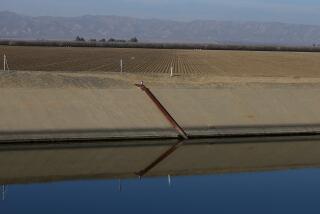Squandered Opportunity
- Share via
One of the greatest scandals of the Reagan Administration is its refusal to spend more than $6 billion since 1981 in offshore oil revenue intended for federal, state and local park acquisition and recreation development. The Administration’s 1989 budget proposes to use only $59 million out of a potential $900 million from the Land and Water Conservation Fund during the coming fiscal year. Most of that amount has to be spent because of court rulings and legal settlements.
The new budget would halt acquisitions for parks and wildlife refuges through 1993. Grants for state and local parks and recreation areas would be eliminated. The total of unused land-purchase authority will grow from about $6 billion now to an estimated $6.7 billion.
Since 1981 Congress at least has insisted on a modest program of the most urgently needed land acquisitions, reaching a peak of $295 million in 1983 but falling to $170.5 million this year.
The Administration’s refusal to use the offshore oil revenues helps explain why the White House has shunned the 1987 report of the President’s Commission on Americans Outdoors. The commission was appointed by President Reagan with considerable fanfare in 1985 to advise him on how best to provide Americans with the recreation facilities and opportunities that they would need in the next decade.
There was magnificent precedent for this. The major recommendation, and success, of the Outdoor Recreation Review Commission in the early 1960s was the creation of the Land and Water Conservation Fund in 1964. Reagan’s commission came back with a remarkably similar recommendation--a new fund that would provide $1 billion a year for park and recreation land and facilities. The President has ignored the recommendation. But Democrats in Congress are moving ahead with legislation to implement it.
The Administration’s excuse for holding the park funds hostage is that the nation should take care of the parks that it has before buying any more. But the longer that critical lands remain in private ownership, the more that they will cost when finally bought--if still available for park use. Most of the parcels proposed for purchase by a coalition of conservation groups are in-holdings within existing park boundaries. Most have been approved in advance by Congress. An example of such property now under intense development pressure is the private land inside the Santa Monica Mountains National Recreation Area.
There is the budget-deficit problem. By not spending the offshore oil money on lands each year, the Administration has been able to keep the deficit about $800 million less than it might have been. But the intent of Congress was that the money be spent on the land purchases as a form of long-term investment. This concept was reaffirmed by Reagan’s own commission, which declared: “The nation should invest in the outdoors some of the money from the sale of non-renewable assets, such as oil.” This would be done through a trust fund so that the money could not be diverted for other uses.
The Administration’s moratorium does not even make economic sense. The land purchases and park development would provide an economic boost to many areas. And the spending of the federal money would put additional dollars into local economies. Of the $875 million proposed by the conservation coalition for spending this year, $200 million would go to state and local governments, which would match the funds--in some cases with assistance from private groups.
Many of the park purchases would be in urban areas that are desperately short of recreation facilities. And the President’s own commission recognized the need “for a strong outdoor commitment from the nation’s capital to safeguard the environment, to expand recreational opportunities on federal lands and to protect and improve the federal estate.”
The United States now has all the natural wild lands that it ever will have. If they are not protected now, they may be lost forever. The nation cannot stand another year of squandered opportunity and shameful neglect of a program launched with such promise in 1964 and crippled since 1981.
More to Read
Sign up for Essential California
The most important California stories and recommendations in your inbox every morning.
You may occasionally receive promotional content from the Los Angeles Times.










